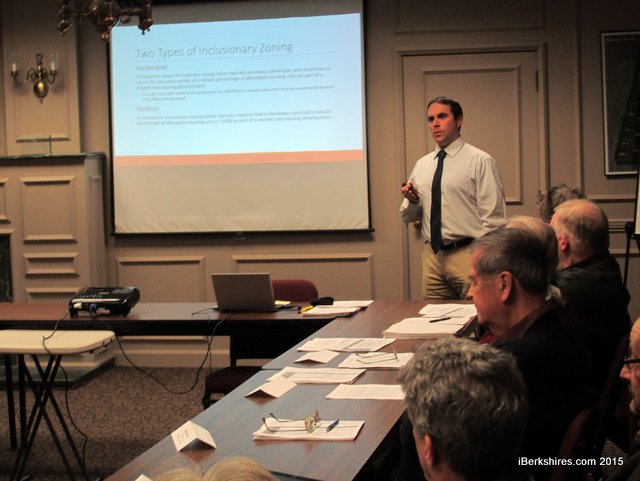BRPC: Inclusionary Zoning Helps Towns Increase Affordable HousingBy Andy McKeever, iBerkshires Staff
02:32PM / Sunday, January 18, 2015 | |
 Planner Brian Domina presented the pros and cons of the type of zoning that is used very little in the Berkshires. Planner Brian Domina presented the pros and cons of the type of zoning that is used very little in the Berkshires. |
PITTSFIELD, Mass. — Inclusionary zoning is one way communities can increase the stock of affordable housing, according to BRPC Planner Brian Domina.
Domina presented to the Berkshire Regional Planning Commission on Thursday about the type of land regulation that is used by several communities in the Berkshires.
"We're trying to figure out how to get more affordable housing into our communities," Domina said.
The need for an increased number of affordable housing units has been cited in a number of communities. Some, such as Lenox and Williamstown, formed affordable housing trust funds to help construct more units.
Domina said another step towns can make to increase the stock is by revamping zoning. There are two types of inclusionary zoning: incentive and mandatory.
"It is not a tool that is widely used in the county right now," he said.
Williamstown is the only town in the Berkshires with mandatory affordable housing written into its zoning, according to Domina. For every housing development with more than 10 units being developed, 10 percent of the units must qualify as affordable as defined in state law.
"Mandatory, in my opinion, should also have incentives," Domina said. "Even if you have a mandatory inclusionary bylaw it needs to be written so it is feasible or else a developer won't do it."
A shortfall in a mandate like Williamstown's on its own is that it encourages developers to reduce the number of units to nine, according to BRPC Executive Director Nathaniel Karns. That's why Domina reminds communities to keep feasibility in mind.
Domina added that the mandate does come with legal concerns. The laws have never been challenged in U.S. Supreme Court. He questioned what would happen if there was an argument claiming it was unconstitutional.
"I don't think it is on as solid of legal footing as other types of land-use regulations," Domina said. "We don't really have any solid cases to say 'yes, it is alright.'"
Incentive-based is a type of zoning used in Pittsfield, Great Barrington and Lee. There are different types of incentives cities and towns can offer.
Domina used an example of allowing two extra market-rate units to be constructed above the regulations for every one affordable housing unit. Cities and towns can also fast-track permitting for developments with affordable housing or relieve developments from other burden such as setbacks, he said.
However, communities need to be aware of the impacts such incentives will have. A project could end up growing to becoming too large or out of place for the character of the area.
"Make sure what you are incentivizing doesn't go against the character of your community," he sad.
In Great Barrington, additional requirements were added to the incentive bylaw to eliminate discrimination. In other cities and towns outside the area, developers have built projects that give the affordable units their own entrance to separate the occupants from the amenities in the development. Great Barrington has laws against that to ensure affordable units are integrated with the entire project.
Domina also reminded communities that if they re-work their zoning to include inclusionary that it be well thought out so as to serve its purpose.
"They're going to do the one they'll make more money on so you really need to think about market conditions and how it all plays together," he said.
Overall, it does take a lot of planning, time and resources to put in place. He suggests towns use a legal consultant for the process if the plan is to use a mandatory law.
However, the legality shouldn't scare anybody off from using the zoning. If done right, it can achieve the goal of increased affordable housing, he said.
| 
 MEMBER SIGN IN
MEMBER SIGN IN
 MEMBER SIGN IN
MEMBER SIGN IN